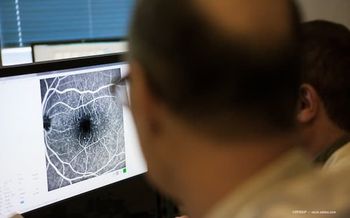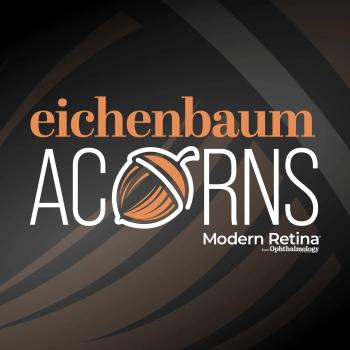
Q&A: Arshad M. Khanani, MD, MA, FASRS, on the CTS 2025 meeting
Arshad Khanani, MD, MA, FASRS, spoke with Modern Retina to share insights for the Clinical Trials Summit (CTS) 2025 meeting being held in Las Vegas, Nevada on June 21, 2025. This fifth-year anniversary meeting marks a notable expansion, with increased participation from clinicians, researchers, investors, venture capitalists, and Contract Research Organizations (CROs).
The summit will showcase over 80 talks and multiple panels, focusing on cutting-edge developments in retinal disease research and treatment. Key areas of exploration include reducing treatment burden, advancing gene therapy, and addressing unmet medical needs in ophthalmology.
Note: The following conversation has been lightly edited for clarity.
Modern Retina: Can you share what's different about this year's meeting?
Arshad Khanani, MD, MA, FASRS: This is the fifth year of our meeting, and this meeting is quite different, because it's much larger than our prior meetings. As you know, CTS is an invite-only meeting, and this year we opened up a pathway for clinicians who are doing research and want to learn more they then an opportunity to attend this meeting through an invited route. So we are very excited about that. We also have a very big participation from investors, venture capitalists, and from Wall Street as well as CROs. So, it's going to be bigger and better this year, and we will do it in Vegas for our fifth year anniversary celebration.
MR: With this expanded group of people, can you highlight some of the areas that will be presented on at this meeting?
Khanani: So we have a lot of talks. We have about 89+ talks at CTS, and numerous panels. I think one of the things I'm excited for is listening to the panel discussions, obviously we have panels on [clinical trial] endpoints, artificial intelligence. We also have investor panels as well as a regulatory guidance panel. In addition, we have multiple first time presentations. We are looking at 3-year data from Ocugen's program for geographic atrophy. We are looking at topline data from Phase 3 sozinibercept trials. We are looking at data from 1-year results from the fellow eye study of RGX-314, and many other novel mechanisms, PR-001, and new ways to treat retinal diseases. So it's gonna be a lot of fun learning about what's new in retina and how these new treatments are gonna change the landscape and outcomes for our patients. And that's why CTS is important, because it brings all the stakeholders together, from industry leaders, from practicing physicians and trialists to CROs investors, so that we can have meaningful discussion about how we can take these new mechanisms of action and novel drugs to market for our patients, so they can benefit.
MR: Overall, as we look at some of these novel drugs and other things that are kind of in the clinical trials process, what would you say is the direction that ophthalmology, and retina specifically, is headed? Is it reducing treatment burden? Is it finding gene therapy candidates? Where do you think the field is focused?
Khanani: I think it's very exciting times in retina currently, because we have multiple shots and goals in different ways. So as you mentioned, treatment burden reduction is the biggest challenge for common retinal diseases. So we have tyrosine kinase inhibitors in phase 3, as well as gene therapy with RGX-314, ADVM-022, and 4D-150, in phase 3 programs. So in addition to TKIs and gene therapy to reduce treatment burden, and they're all in late stage treatment, we also have novel ways to address that and to improve, you know, disease control, like tri-specific agents instead of just mono- or bi-specific agents. So there's a lot of innovation going on. But yes, I agree the biggest challenge is treatment burden for patients, and that's being addressed in late stage programs.
The other thing is geographic atrophy. We are lucky to have 2 FDA-approved treatments, pegcetacoplan, and avacincaptad pegol, but the idea is, can we do better? So we have multiple programs in phase 3 stages looking at improving functional outcomes, slowing down geographic atrophy, and looking at ellipsoid zone loss in these patients.
So that's what's going on in terms of GA, and then for inherited retinal diseases, we have a lot of different programs that are looking at treatment for retinitis pigmentosa, Starguardt disease, and that's been a big unmet need not to have approved agent for IRDs. We have a robust session on IRDs with multiple different programs trying to address the unmet needs. So as a field, we are lucky that there's a lot of innovation happening, and hopefully many of these programs will be successful, so we can take it to patients and improve their outcomes.
MR: When you look at the list of presenters and topics, are there any in particular that stand out to you as someone who will be at the meeting that you're looking forward to?
Khanani: Well, I think, as a meeting co-chair, I'm thrilled to see every single presenter. There's a reason they were invited. They bring their experience, they bring new data or their take on the data and their comments on the panel discussions. So overall, I'm looking forward to the whole meeting, but if you had to ask me what I'm looking forward to, obviously the first time results section is always exciting, because we will be revealing a lot of new data in that section, and that section is planned at the end of the meeting, after a long day. So hopefully people stick around to listen to the latest and greatest results in retina. And the other thing about CTS is hallway discussion as well as panel discussions. You know, it's a meeting which is designed to be very discussion oriented and only through discussion are we able to come up with meaningful solutions to many issues we face in drug development.
I'm also really excited about artificial intelligence. We have a whole section on artificial intelligence, how it can help in clinical development, as well as an artificial intelligence panel to see how we can all figure out where AI is going to take us, because I'm a firm believer that AI will be very, very helpful in development, from recruitment to finding new targets to making sure that the burdens on sites and staff is less, less screen fails, collaborating with CRO, so there's a lot of things we plan to discuss at the upcoming CTS 2025.
Newsletter
Keep your retina practice on the forefront—subscribe for expert analysis and emerging trends in retinal disease management.



























